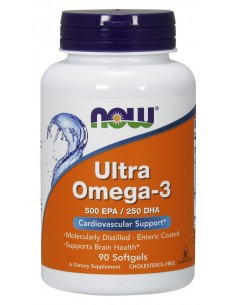- Redazione
- Wellness
Omega 3 fish oils have recently received negative publicity. There have been concerns about the potential contamination of mercury in fresh fish, although this has been refuted as an overly exaggerated problem. And more recently, a meta study, which is a "study study", was published online and seemed to suggest that the benefits of omega 3 for heart health and cancer were not true.
But Dr. Ray Rice, a food scientist, rejected the results of this and other studies. He said that despite the claim that 48 studies were reviewed, only 12 were actually reviewed and of those 12, 3 or 4 should not have been included. He described the report as "conceptually imperfect", with a defective technique that was misleading to the public.
There is a wealth of scientific evidence to support the health benefits of omega 3 fatty acids. Omega 3 fatty acids are found in fish oils, from fatty fish such as salmon and, of course, good quality (not rancid) fish oil supplements.
The general benefits of Omega 3 include:
- protection against cardiovascular disease and improved heart health;
- improved joint health;
- improved mood and behavior, includingADHD, attention deficit disorder;
- good fetal development during pregnancy;
- inhibition of certain cancer cells.
The benefits of Omega 3 for heart health
The heart health benefits of Omega 3 have been well documented. The Food Standards Agency and the British Nutrition Foundation recommend that people eat 2 servings of fish a week, one of which is a salmon-like fatty fish, rich in omega 3 fatty acids.
A small study of 18 white men, aged 68 and over, who had had a heart attack from 3 months to 5 years earlier found that omega 3 fish oils benefited their hearts and potentially reduced the risk of further heart attacks.
These men took a supplement containing 810 mg of fish oil a day for 4 months and those taking a placebo took a mixture of corn oil and olive oil. The participants did not know whether they were taking a placebo or not.
Their heart rate at rest and after exercise was measured. It was found that those taking Omega 3 fish oils had a lower resting heart rate and their heart rate returned to normal more quickly after exercise. Those men who have a high heart rate at rest are more likely to have a heart attack and die for one.
A study designed to evaluate the combination of 3 supplements that were found to individually protect against cardiovascular disease found that when used together, the benefit was much stronger. The 3 supplements were omega 3 fish oils, niacin and vitamin E. Niacin, due to the high-dose side effects, was a low-dose component. Despite this low dose, the study found that those taking the combination of niacin, fish oil and vitamin had a greater benefit than those taking fish oil and vitamin alone.
The study was a double-blind, placebo-controlled study with a control group taking none of the supplements. 57 volunteers took the supplements for a period of 4 months. After this period, it was found that the total antioxidant capacity of the volunteers taking 2 or 3 of the supplements increased, with the largest increase in the group taking the combination of omega 3, niacin and vitamin e. This third group also had significantly higher levels of vitamin e, while those not taking niacin did not have this benefit. This is because niacin and another component of that supplement, gamma-oryzanol, preserve the vitamin and in the body.
The study also found that the cellular agents that are involved in inflammation were reduced in both these groups by taking the supplements. In particular, the tumor necrosis factor alpha (TNF-alpha) was reduced for both, but only in the group taking the supplement niacin and gamma-oryzanol was the reduction of the inflammatory agent interleukin 1-beta (IL 1-beta) significant.
Combination of Omega 3 supplements
However, it is not only Omega 3 fish oils that offer the benefits. For specific conditions, a combination of omega 3 and omega 6 fatty acids are very useful.
A recently published study found that adolescents between the ages of 12 and 15 who were taking a supplement containing both omega 3 and omega 6 fatty acids had a significantly improved attention span. These adolescents were clinically diagnosed with moderate to severe ADHD and had persistent problems with both impulsivity and attention and concentration.
At the start of the study, inattention of these students was measured at 94% on average. After 3 months of taking a supplement containing high quality omega 3 fish oil and omega 6 fatty acid, evening primrose oil, the inattention of the students dropped to 17% on average.
As for impulsiveness, there were similar benefits. From an average score of 89%, impulsivity scores dropped to an average of 28nt by the end of the process.
Even the evening primrose oil was of high quality, being produced from virgin evening primrose oil. And the study participants were aware that they were taking the supplements, so it was not a double-blind study. But the results are still excellent. The EPA content of the fish oil component was 500 mg per day, which in this case was the equivalent of 6 capsules, although this will vary depending on the different formulations. EPA simply means eicosapentaenoic acid and is a kind of active component in the essential fatty acids of fish oil.
Last posts
-

Omega-3s and their health benefits
Omega-3 is one of the most highly valued and often recommended nutrients available today, with numerous research...
-

GABA - Gamma aminobutyric acid: neurotransmitter, role and supplements
Gaba is an inhibitory neurotransmitter. It decreases the ability of a nerve cell to receive,...
-

Spirulina vegetarian source of vitamin B12
Spirulina is a blue-green algae believed to be the first plant life form on earth (almost 3.5 billion years old)....



